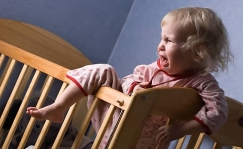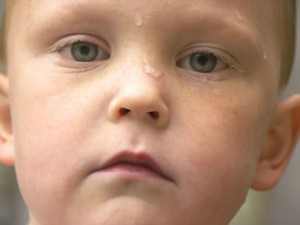It is difficult to imagine a depressed third-grader. It is even more difficult to imagine a depressed preschooler. Although childhood depression is a well-recognized and treated disorder, only recently have research studies begun looking at depression in children younger than six years old. In the new Current Directions in Psychological Science, a journal of the Association for Psychological Science, child psychiatrist/researcher Joan Luby from Washington University in St. Louis reports on recent findings examining depression in preschool-age children and the importance of early detection. [continue reading…]
Childrens Health
Children diagnosed with bipolar disorder may fare better with a different diagnosis, according to research published by Hastings Center scholars Erik Parens and Josephine Johnston in Child and Adolescent Psychiatry and Mental Health.
Parens and Johnston examine the evolution of the diagnosis of bipolar disorder in children and its dramatic increase since the mid 1990s. They emphasize that there is vigorous debate about whether symptoms in children accurately reflect the criteria for bipolar disorder, particularly for mania. The researchers support an emerging approach that would give many of those children a new diagnosis called Severe Mood Dysregulation (SMD) or Temper Dysregulation Disorder with Dysphoria (TDD).
Their findings, which were supported by a grant from the National Institute of Mental Health, come soon after proposed revisions to the American Psychiatric Association’s Diagnostic and Statistical Manual of Mental Disorders (DSM) were opened to public comment. [continue reading…]
 Bad behaviour in childhood is associated with long-term, chronic widespread pain in adult life, according to the findings of a study following nearly 20,000 people from birth in 1958 to the present day.
Bad behaviour in childhood is associated with long-term, chronic widespread pain in adult life, according to the findings of a study following nearly 20,000 people from birth in 1958 to the present day.
Chronic widespread pain is a common complaint that can have a major adverse effect on quality of life, often requiring referral to a hospital specialist for investigation and treatment. The research, published online in the journal Rheumatology today (Wednesday 10 March), found that children with severe behaviour disturbances had approximately double the risk of chronic widespread pain by the time they reached the age of 45 than children who did not have behaviour problems. [continue reading…]
Before therapists and medication, were kids better off working out mental health problems for themselves?
That’s the question explored by psychotherapist Erik Kobell in today’s New York Times Cases column, which was inspired by a bar patron who overheard Dr. Kobell’s conversation with a fellow therapist.
“I can tell you one thing,” he announced, as I recall. “Back in my day, you didn’t have young kids going around talking to shrinks. . . .Back in my day, kids were kids! We worked out our problems on our own. We didn’t go crying to some stranger with a whole bunch of initials after his name.”
But were kids better off working things out for themselves? To learn more, read the full column, “Fake Nostalgia for a Pre-Therapy Past” and then join the discussion.

